
Nov 2, 2023
Nigeria Labor Congress (NLC) President Joe Ajaero was beaten and arrested November 1 as workers rallied to protest unpaid wages in Imo state in southeastern Nigeria. Police reportedly beat Ajaero and assaulted protesting workers with machetes and confiscated their mobile devices. Some NLC and Nigeria Trade Union Congress members who attended the rally say they have not been paid for up to 20 months. Ajaero was released from police custody to a hospital because of his injuries.
Solidarity Center Executive Director Shawna Bader-Blau offered this statement:
“The Solidarity Center joins calls by the Nigeria Labor Congress and the Nigeria Trade Union Congress in condemning the assaults on NLC President Joe Ajaero and the workers who rightfully stood up to receive the pay that they worked for and deserve. Violence and bloodshed have no place in the democratic exercise of the freedom to peacefully gather. The fundamental right of workers to be paid what they are owed is one of the bedrock principles of democratic societies. Efforts to intimidate workers and their elected leaders through brutal attacks must be called out for what they are: violations of fundamental human rights as guaranteed by international conventions and the African Charter on Human and Peoples’ Rights, all of which the Nigerian government has signed.”
Our thoughts are with Joe Ajaero and all those injured as we call for justice to the perpetrators of these crimes.”
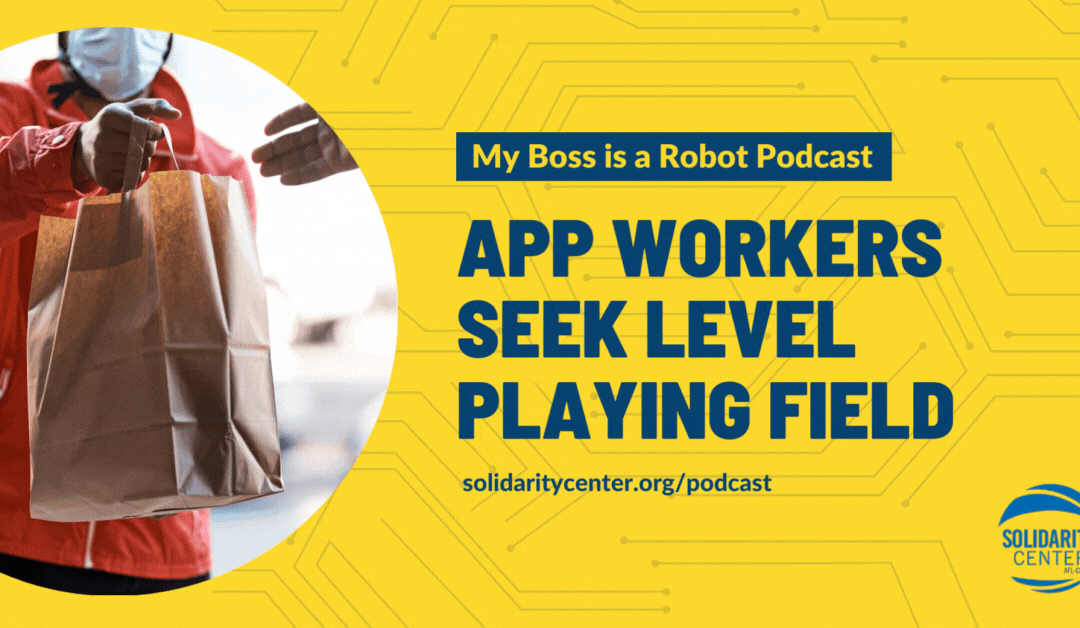
Sep 13, 2023
For many job seekers, joining the ranks of delivery drivers or other app-based workers is sold as entrepreneurship–a way to make money as an independent contractor and be their own boss. But the reality is much different, as workers from Africa to Latin America have found out.
“Just in Latin America, we see millions of [app-based] workers who are exploited, who are working injured, who don’t even have a minimum salary guaranteed, who are risking their life every day with no guarantees whatsoever because the company can terminate them if they deem that they’re not meeting certain standards,” says Mery Laura Perdomo, a lawyer for the International Lawyers Assisting Workers Network (ILAW), a Solidarity Center project.
Perdomo and other experts joined Solidarity Center Podcast Host Shawna Bader-Blau on App Workers Seek Level Playing Field, the second episode of “My Boss Is a Robot,” to discuss how delivery drivers and other app-based workers are excluded from basic labor protections because companies have classified them as “independent contractors”–all while enforcing rules and requirements as in a standard workplace.
But even as app companies around the world have waged multimillion dollar campaigns to prevent court decisions or legislation that would classify gig workers as employees, delivery drivers are standing up for their rights on the job.
Explore their battle for fair treatment as they seek to be recognized by companies as the employees they really are.
“My Boss Is a Robot” is a six-part series that seeks to shine a light on the behind-the-scenes practices of app companies who exploit workers in the global gig economy. Download the latest episode, App Workers Seek a Level Playing Field, and watch for the next episode on September 27.
Listen to this episode and all Solidarity Center episodes here or at Spotify, Amazon, Stitcher or wherever you subscribe to your favorite podcasts.
Apr 5, 2023
“Unions are the largest civil society organizations in any country, they are membership-based, sustainable, and are themselves examples of democratic practice,” said Shawna Bader-Blau, the executive director of the Solidarity Center. “Weak or strong, they have elections.” Their capacity to mobilize, act collectively, strike and force political change far outweighs whatever smaller nongovernmental organizations can muster, she said.
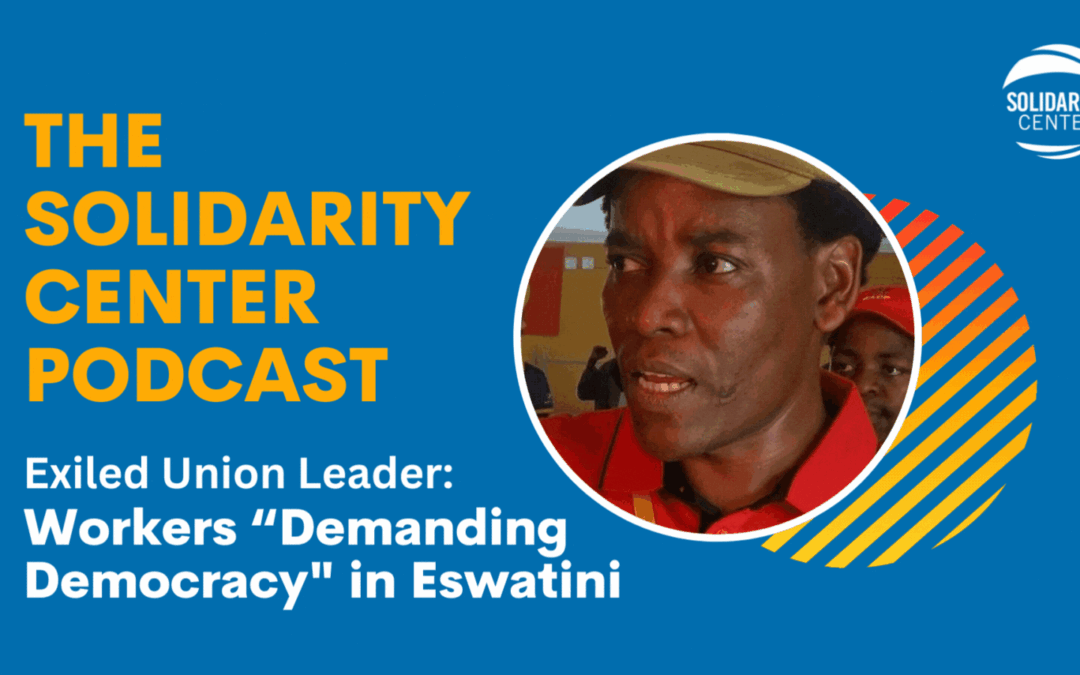
Mar 16, 2023
In Eswatini, a landlocked country in southern Africa, union workers are routinely harassed, attacked and even killed for going on strike or holding rallies. In 2021, dozens of workers were killed by security forces in what Amnesty International called “a full-frontal assault on human rights” by the government in response to ongoing pro-democracy protests. In January, prominent human rights lawyer Thulani Maseko was shot dead, hours after a speech by the king warning those calling for democratic reforms that mercenaries would deal with them.
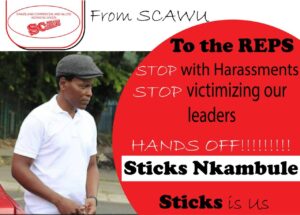
Exiled SWATCAWU leader Sticks Nkambule is receiving support from SCAWU and other unions in Eswatini. Credit: SCAWU
Most recently, Sticks Nkambule, general secretary of the Swaziland Transport, Communication and Allied Workers Union (SWATCAWU), was targeted by the government for leading a strike to improve working conditions. Forced to flee Eswatini, formerly called Swaziland, Nkambule described the interconnected struggle for worker rights, human rights and democracy on the latest Solidarity Center Podcast.
“We are just demanding the basics of what could be defined as democracy. A government that is formed by the people and serving their interests,” Nkambule told Podcast host and Solidarity Center Executive Director Shawna Bader-Blau.
“By bringing together the collective voice of all workers, unions fight for decent working conditions but also for the freedoms fundamental to all democratic societies,” Bader-Blau told Nkambule.
Despite the brutality and repression, Nkambule finds hope in the support from labor and human rights organizations around the world—and in workers themselves.
“What is quite inspiring is that the people of Swaziland are determined to be part of the conversation that is going to change their discourse. It is a reality, activists and, not just labor, beyond labor.”
Listen to this episode and all Solidarity Center episodes here or at Spotify, Amazon, Stitcher, or wherever you subscribe to your favorite podcasts.
Download Recent Episodes!

Mar 10, 2021
“Violence and harassment happens to all workers, irrespective of your gender,” says Brenda Modise, a union activist in South Africa. “It doesn’t matter whether they are men and women, old young LGBTQI community or anyone, but we are addressing violence and harassment in the world of work against all workers.”
Modise spoke with Solidarity Center Executive Director Shawna Bader-Blau in first episode of The Solidarity Center Podcast, “Billions of Us, One Just Future,” which highlights conversations with workers (and other smart people) worldwide shaping the workplace for the better.
(Join us for a new episode each Wednesday at iTunes, Spotify, Amazon, Stitcher or wherever you listen to your podcasts. )
Front-line Leaders Building a Future Inclusive of All Workers
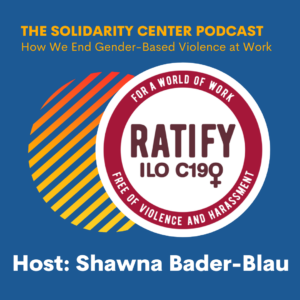 The Solidarity Center Podcast’s seven-episode season will feature worker advocates from around the world:
The Solidarity Center Podcast’s seven-episode season will feature worker advocates from around the world:
- Maximiliano Garcez, a labor rights lawyer who describes workers’ efforts to seek justice following a deadly mining accident in Brazil.
- Adriana Paz, an advocate with the International Domestic Workers Federation who understands firsthand the power of unions in ensuring domestic workers have safe, decent jobs.
- International Trade Union Confederation President Ayuba Wabba, who explores the Nigerian labor movement’s response to the COVID crisis on workers, and discusses the global labor movement’s plans to build back better for workers around the world.
- Preeda, a migrant worker rights activist in Thailand working with unions to help migrant workers meet the challenges of COVID-19.
- Sergey Antusevich, a brave union leader in Belarus working for democratic freedom in a repressive regime.
- Francia Blanco, a domestic worker and trans rights activist reaching marginalized workers through her all-trans domestic workers union.
These front-line leaders will share the steps they are taking to shape their livelihoods at the workplace and in their communities in the face of escalating attacks on democracy and civil rights, and explore how they seek to build a more equitable future, one inclusive of all workers as the COVID-19 pandemic upends structures, systems and societies.
‘Tears of Joy’
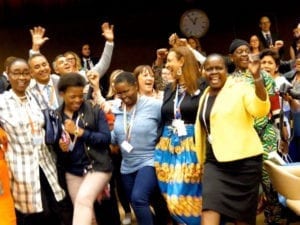
Union activists celebrate after the ILO adopts Convention 190 to end gender-based violence at work. Credit: ITUC
In the first episode, Modise shares how she and women unionists around the world campaigned for adoption of an International Labor Organization convention (regulation) on ending gender-based violence and harassment in the world of work, and how they are moving forward the campaign by pushing their governments to ratify Convention 190.
“We need to put more effort as the women in South Africa to make sure that whatever that you have were fought for is going to be realized in South Africa and be incorporated into our own legislation and make sure that it is implemented. We should not only have beautiful legislation, but we should have implementable legislation that we can be able to monitor and evaluate.”
As Modise heard an audio clip of women unionists singing and clapping the moment Convention 190 was adopted in 2019, she reflected on her experience.
“It was a breathtaking moment. We all shed tears. It was tears of joy because remember, when you went into that room as workers of the world, we knew what we wanted, but we didn’t know if the business constituents of the world understand where we are coming from.
“It really feels great, even though the bigger work has not yet started. We really want South Africa to ratify the convention. The work is not going to be ending at ratification. It’s also going to go in terms of after ratification, what next, and that’s where the bigger role and our activism is going to be needed.”
This podcast was made possible by the generous support of the American people through the U.S. Agency for International Development (USAID) under Cooperative Agreement No.AID-OAA-L-16-00001 and the opinions expressed herein are those of the participant(s) and do not necessarily reflect the views of USAID/USG.






 The Solidarity Center Podcast’s seven-episode season will feature worker advocates from around the world:
The Solidarity Center Podcast’s seven-episode season will feature worker advocates from around the world: